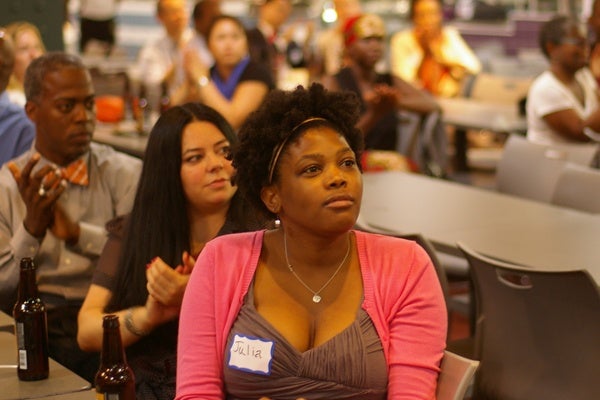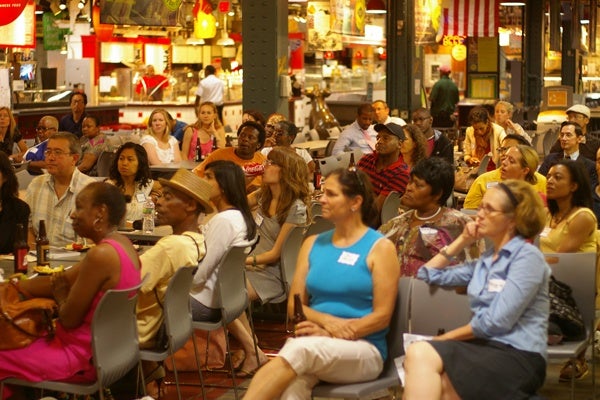Sharing opinions and beer, Philly summit participants tackle racial issues
Talking about race can be a tense experience filled with the stress of clashing opinions and charged feelings. One way to ease those tensions a little bit? Free beer and snacks.
Visiting from Seattle, Giavonna White was looking for something to do Wednesday night. Something interesting, something free.
When she heard a “beer summit on race relations” was being held at Reading Terminal Market, she felt it was a forum with which she could identify.
“I feel like there’s an imbalance of a lot of black men in prison. I see it in my family and in other people’s I know family,” White said.
Free beer didn’t hurt either.
“I feel like it makes everybody, you know, chill out, makes them a little more fun loving,” she said.
That’s exactly the idea. Spawned from President Obama’s 2009 sit-down with Harvard Professor Henry Louis Gates and the police officer who arrested him for disorderly conduct outside of his own house, Philly’s fourth annual beer summit aims to propel conversation on topics such as income inequality, the racial implications of politics and the psychological limits we place on people by stereotyping.
Kevin Watkins, who teaches at the Urban Promise Academy in Camden, loves the opportunity for frank discussion.
“Not to be cliché,” Watkins said, “I think dialogue is a helpful medium for creating positive social change.”
Setting the stage
Even the room’s layout is meant to drive that change.
“The set up is very intentional,” said Todd Bernstein, president of Global Citizen, the nonprofit organizer of the event.
“We have tables where people kind of have to be together. I mean someone said, ‘Well, do you want to do a theater style?’ No we want people to be in a physical space where they’re together and sort of close physically,” said Bernstein.
He wants them close physically, but comfortable enough to share opinions — no matter how blunt or controversial.
North Philly’s Cathy Robinson could appreciate that. She feels that racial tensions across the nation are palpable.
“I think if we lived in a one race society,” she said, “health care wouldn’t be an issue.”
Columbia University Professor and former Fox News contributor Marc Lamont Hill drove much of the evening’s conversation. Focusing on racial identity in the era of Barack Obama, he says it’s dangerous to believe that America has become post-racial after electing its first black president.
“The idea of post-raciality is bad because it pretends that to be different is a problem –that we want to see everybody the same,” said Hill. “No, I don’t want to live in a world that’s post-racial. I want to live in a world that’s post-racist.”
Don’t call yourself “colorblind,” Hill says. “Say ‘I see color, but I don’t hold it against you.'”
Internal crisis of racial values
Beyond the labels, Hill thinks America suffers from a crisis of inbuilt racial values and distinctions. Blacks, Hispanics and other minorities, he says, are stuck with the general pervasive feeling of being inferior to whites.
“I know black people who will drop trash in front of their own house, but will go to Lower Merion and throw it in the trash can, and they don’t even think about it,” Hill says. “We’ve internalized the idea that those neighborhoods are worthy of being clean and ours are not.”
Another symptom of this crisis, he says, is evidenced by white people who vote against their financial interests in order to identify with their richer white counterparts.
“The white farmer in Appalachia will support George Bush and support the tax cuts for the rich and then write me a letter,” said Hill, “and say I’m tired of you people taking my money.”
Diverse enough?
Despite the two-hour back and forth, some felt the crowd lacked a diversity of ideology — that the event simply gathered those who already agree on most of the issues presented.
“We need to invite or encourage other people of differing opinions to come to things like this,” said Julia Ransom, a graduate student in Temple’s urban education program. “I don’t know how you’d do this; I honestly don’t know.”
That possibility may come sooner rather than later, as the event’s organizers pursue the idea of monthly forums.
The prospect of more free beer, though, is still unknown.
WHYY is your source for fact-based, in-depth journalism and information. As a nonprofit organization, we rely on financial support from readers like you. Please give today.






